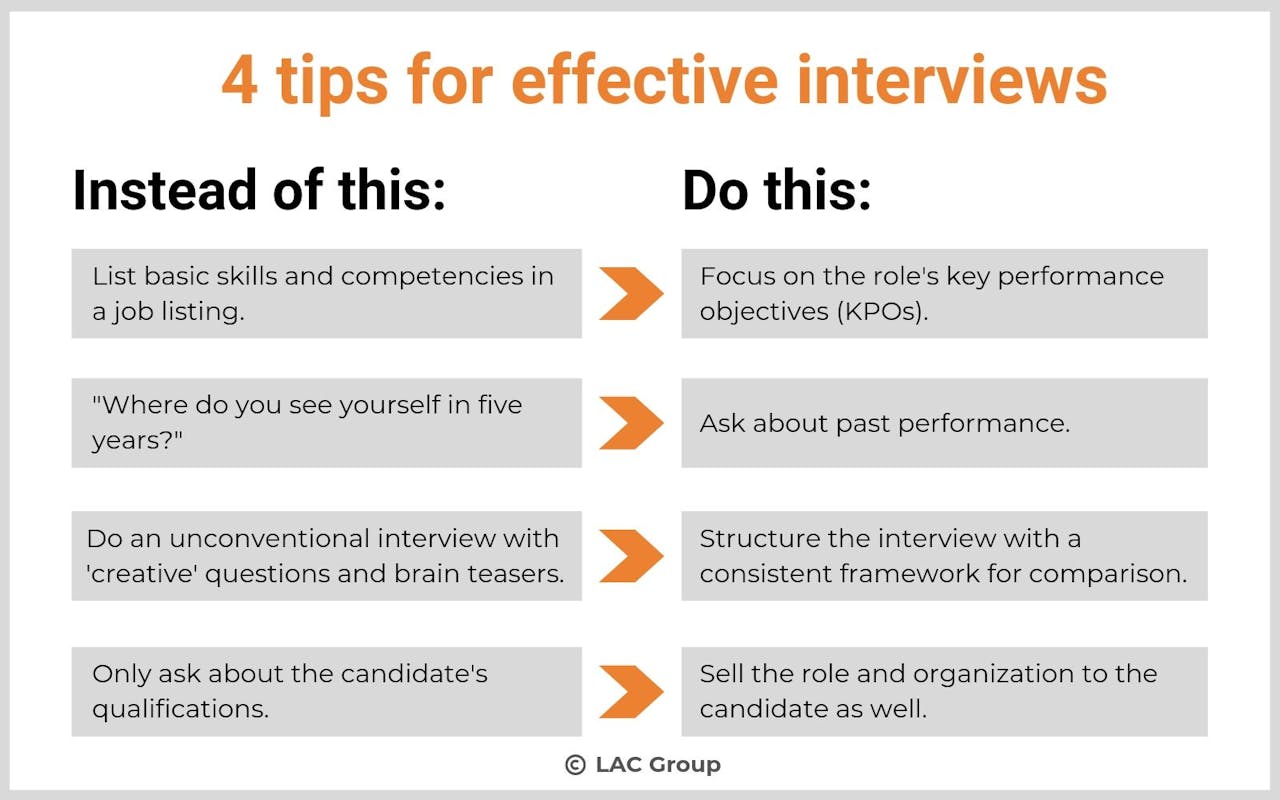
“So, where do you see yourself in five years?”
It’s a dreaded question, usually asked by interviewers who either lack experience or who think it’s a useful indicator of a candidate’s ambitiousness. When there are so many innovative ways to conduct an interview, and so many creative questions, there’s no excuse for interviewers to fall back on clichés. If you don’t know what to ask during an interview, read on.
We’ll explore ways you can provide an interesting and challenging experience that demonstrates respect for the candidate, enhances their impression of the organization and ensures you’re finding the right person for the job.
Understand the job requirements
It’s incumbent on the interviewer to understand exactly what the position entails. A formal and detailed job description is the basis for attracting the right candidate, and for formulating the questions that assess whether the candidate is a good fit and can perform the job satisfactorily.
Not any job description will do. According to hiring guru, Lou Adler, job descriptions should not just be lists of skills and competencies, but rather should focus on what the person in that role must accomplish in a given time frame in order to be successful. Adler calls these key performance objectives (KPOs), and they take the form of SMART goals (specific, measurable, achievable, relevant and time-based).
As an example, a performance-based job description for a sales person could include the following objective:
Within 60-days assess the current territory and develop a sales plan. Meet all existing customers, evaluate leads and assess the overall territory potential. Launch and implement a strategy to achieve sales targets, maintain relationships with existing customers and establish a presence in each target account.
If you’re worried that a job description like this won’t effectively assess soft skills, it’s easy to see how skills can be converted into objectives. For example:
- Cultural fit and team skills can become “collaborate closely with engineering and operations to ensure a successful redesign and launch of new product lines.”
- Results-oriented can become “implement a project management system to ensure critical launch and customer delivery dates are met.”
- Strong verbal and written communication skills can become “prepare and lead the monthly operational reviews at the executive board sessions.”
Ask the right questions
Once you know what the candidate must do to be successful, that’s when it’s time to formulate the questions that indicate whether the candidate has done something similar that can be applied to the situation. Past performance is a predictor of future success, so take the time to learn what the candidate has done before. According to Adler, you only need one simple question for this:

With that opener, then you probe more deeply to learn the specifics of why that accomplishment was so significant, the results, their challenges, the skills they applied to achieve the objectives, the ways they engaged and influenced others, and anything else that would illustrate how their achievement relates to the objectives of the position.
It should take around 15-20 minutes to fully explore a significant accomplishment, and you can ask the question again to explore another accomplishment from previous positions the candidate has held. By the end of the interview, you should have a very good idea of how the candidate approaches and solves problems, interacts with others and whether they possess the skills, competencies and motivation to perform the job.
Other parts of the interview
Of course, there are plenty of other creative interview questions you can ask to determine whether the candidate is right for the job, able to think on their feet and a good fit with the team. Just be sure the questions really tell you something about the candidate and are not just for the sake of shaking them up or putting them on the spot—interviews are stressful enough as it is.
In fact, it’s been shown that unconventional questions or brain-teasers don’t result in better hires. Google was well-known for asking puzzle-type questions, but discontinued that practice after realizing “brainteasers are a complete waste of time…They don’t predict anything. They serve primarily to make the interviewer feel smart.”
Instead, what works well are structured interviews, where each interviewer has a consistent framework for assessing candidates. Since all interviewers probably won’t conduct the performance-oriented part of the interview, a framework that helps them score the answers to behavioral and situational questions will give the team a common basis for comparison.
Sell the position
In today’s competitive talent environment, it’s important to realize that candidates are also interviewing you as they decide whether to join your team. If you believe that a candidate is right for the job, then spend some time selling the role and the organization to the candidate. Highly-qualified candidates will likely have multiple opportunities, so if you want them to also choose you, then give them a good reason.
Beyond the basics of health coverage or vacation time, choose a few benefits or perks that you can brag about—whether it’s gym memberships, education allowances or bagel Fridays. These all contribute to a candidate’s overall impression of the organization and can affect their decision about whether to accept an offer.

Perfecting the interview
Like any other skill, interviewing improves with training and practice. If you’re uncomfortable about your interviewing skills, don’t be embarrassed; take the initiative to improve them. Your HR or recruiting team can help and will gladly work with you to ensure you understand the organization’s process and interviewing techniques. After all, you all have the same goal when it comes to hiring the best person for the job.
